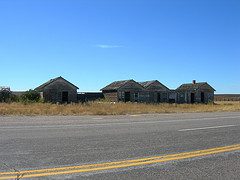What would you do if someone told you your town, the place you'd grown up in and where you had connections, a place that had meaning to you, ought to be abandoned, because someone determined through economic analysis that your town was a parasite feeding off the good graces of the state?
There's been a fair amount of talk on rural blogs recently about whether small towns and rural areas in many parts of the country will ever see economic prosperity. I've seen a lot of discussion recently about this question in Appalachia, where coal mining historically has been the bedrock of the economy. Some have asked, after decades of studies of what it will take to replace lost mining jobs, whether there can be an economic development “solution.” Most of coal country is just a couple hours' drive from a decent-sized city, but that's far enough away to keep these areas out of touch with metropolitan economies. Meanwhile there isn't much of a homegrown driver, such as a major tourist attraction or natural beauty, to draw people to come and circulate dollars in the community.
There are still quite a few people living in Appalachia, which sets it apart from the Great Plains, another region much talked about for its apparent downward spiral. One geographer proposed re-populating the Plains with buffalo. After all, so many people had left that many towns were virtual ghosts. Yet the bones of community are still present in these places—the roads, power and phone lines are maintained and social services provided.
Recently a businessman and aspiring politician from Maine offered a radical suggestion.
Since so many of Maine's small towns do not contribute toward the economic growth of his state, why not cut off public services to those places? He reasons that while at one time in history there was a purpose for these communities—many grew up around paper mills or nearby forestry operations—there isn't any longer. The state subsidizes these towns' roads and other utilities in order for them to continue to function, because the towns' tax base has shrunk to the point where they can't possibly support themselves.
This businessman stuck a nerve, not just because he seemed to imply that people should be forced to move to the city, but because he was calling into question places' ability to reinvent themselves.
My own town is not in one of these remote locations and has never been at risk of dying, but one could say it looks a little scruffy. Town leaders decided a few years ago to invest in widening the sidewalks and to do some other things to make the downtown more inviting to pedestrians. People do come to town to do some shopping, and if the town looked more appealing they might stay longer. Others passing through might stop, and still others would hear about the new look and come check it out. The net result could be new businesses, jobs, and vitality. Maybe it will be on a pretty small scale, but hey, it's a small town.
On a larger scale, regions composed of small towns and far-flung hamlets from Appalachia to Maine in fact can and have found ways to revive themselves. That was the response of the Bangor Daily News editorial page to the Maine businessman. Don't write a place off too soon—there may be an economic engine hidden and waiting to be harnessed.
(Photo by Jimmy Wayne, CC BY-NC-ND.)






(From my central PA perspective) It seems to me that small towns offer a remarkably achievable vision of sustainable living-
– Current disinvestment means buy-low development options and a combination of infill and rehab/use opportunities.
– Mix of uses and types provides opportunity for mixed income and walkable development. Vibrant small towns reduce reliance on private automobiles.
-Existing infrastructure and relatively dense configuration is inherently efficient.
We need policy and programs that target revitilization of small towns!